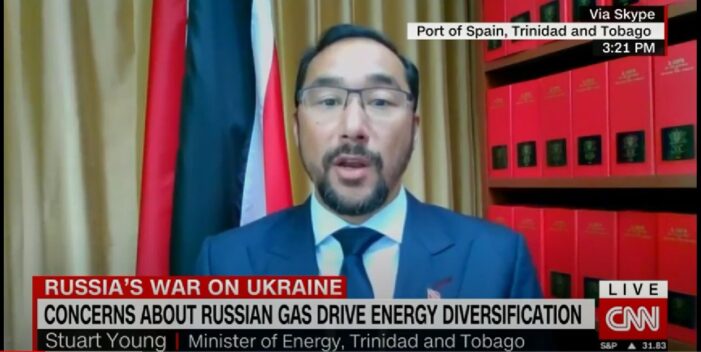By Linda Nwoke
Fossil fuel price volatility has rattled global energy markets. Caribbean Community (CARICOM) member states are particularly vulnerable, importing more than 85 percent of their energy. This causes consumers in CARICOM countries to pay almost double the average price for electricity than those in the United States. CARICOM houses a mixture of hydrocarbon and renewable reserves that can strengthen regional energy. The United States can be an important partner in helping CARICOM capitalize on its energy resources and strengthen US-Caribbean relations in the process. How can US initiatives such as the US-Caribbean Partnership to Address the Climate Crisis 2030 support energy resilience and security in the Caribbean? What steps should the US government and private sector take to support the region’s energy plans? How can US-Caribbean energy cooperation advance the region’s economic development?
In a recent discussion with the Atlantic Council, the Honorable Stuart Young, Minister of Energy and Energy Industries from the Republic of Trinidad and Tobago, shared insights on how they intend to advance energy security in the Caribbean and their role in the Caribbean and neighboring countries.
The Situation
Minister Young confirmed the growing clamor for investments in the renewable energy sector, especially in Guyana, Suriname, Trinidad and Tobago. These countries have significant hydrocarbon reserves that can support short-term energy security. However, it needs capital and investment from countries to keep the energy transition.
Importance of Energy Security
He explained that energy security had become a critical priority for most governments in the world because of its impact on food security. In the past months, the CARICOM region was allowed to engage directly in discussions with the highest levels of the US government. “And coming out of the Summit of the Americas is the decision taken by President Biden, along with Vice President Harris, for a meaningful engagement with the CARICOM region and the Dominican Republic on energy security, food security, and the financial side.”
Role of Trinidad and Tobago
The twin-island state has over a century of experience exploring oil within the hydrocarbon industry. In twenty-five years, it had become a significant player in the gas side of hydrocarbon fossil fuels. Recently, Guyana found significant oil reserves and began exploring. Suriname is still exploring its resources to determine the number of liquids and gas.
The three sovereign states within the CARICOM region have become part of the global energy security solution. Trinidad is positioning itself as part of the decision-making countries with other key players because of the number of gas reserves, ammonia, methanol, and urea on their land. “And when I say gas, half of our gas production is used in liquefied natural gas (LNG) production. The Atlantic LNG is a four-train facility with three trains up and running and our petroleum chemicals,” says Minister Young.
He explained that since February 2022, fertilizer and ammonia have become even more essential in global conversations. A sector they had been ranked as the second largest exporter of ammonia globally.
Therefore, the country has significant capacity for production in all its plants. The Minister explained that they have been exploring becoming a stable energy security entity. They generate electricity from their natural gas in and beyond the CARICOM region.
How the United States Can Work with Trinidad and Tobago
They have decided to work responsibly with Guyana and Suriname by strengthening their partnership within the hydrocarbon sector. Therefore, discussions have commenced on ways to clean up ammonia production and support their plants to produce ammonia for better food security.
The United States, since the summit and other direct engagements with the Energy Security Committee, they have been discussing the role and assistance that the US can render in the CARICOM region. “A lot of our small island systems, neighboring countries are suffering from the high cost of electricity,” says Minister Young. Other ongoing discussions with multilateral lending agencies, and investors with capital, is how to organize projects utilizing renewable resources to spread energy security throughout the Caribbean states. “And I think if we engage and work together, there will be more beneficial for the region,” he says.
Post the summit, and there are two significant issues in the energy security space being discussed:
One is how to access financing for renewable resources to help the smaller Caribbean countries that make up CARICOM, a region that suffers significantly from the devastating effect of climate change.
Secondly, it advocates that the richer, developed countries should provide concessional financing to smaller islands that can’t afford it. “I mean, an island like the Dominican Republic had a hurricane pass through in 2018 that wiped out over 50% of their GDP. They are yet to recover and can’t repeat their concessional loans. So there is a global responsibility for the more affluent and developed countries to come forward and provide grant funding. To get some of these projects off the ground so they can offer better energy stability,” he requested.






